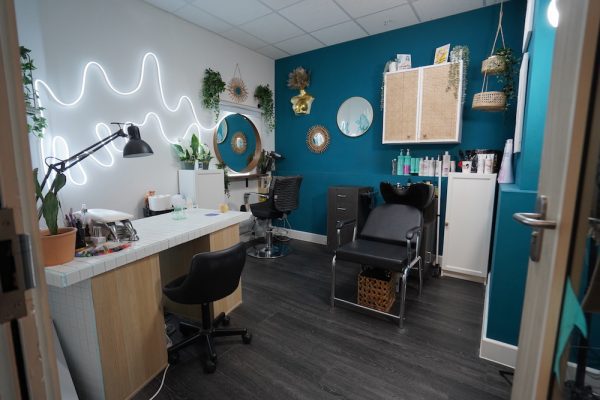In the ever-evolving world of hairdressing, the question of when to go freelance is one many stylists grapple with. For some, it’s a natural progression born from ambition and independence; for others, it’s a carefully calculated move toward creative and financial freedom. Few know the balancing act better than John Gillespie, a globally recognised name in the hair industry having worked across 50 different countries for over 4 decades in leadership roles for brands such as Schwarzkopf, L’Oreal and Amway Corporation alongside being behind the chair with his clients each and every week.
Today, John is the Managing Director for Phenix Salon Suites across UK and Europe, a role that was born out of seamlessly blended time spent working in-salon with running a successful solo business.

Building a Foundation Before the Leap
“I’ve always had huge ambitions—I wanted to do everything,” says John. “But I strongly believe that everything starts in the salon. That has to come first.”
He explains that building a client base, refining skills, and maintaining a steady income are crucial before exploring more creative pursuits. “Exciting projects don’t always pay well, if at all, so you need something stable to balance that while you build your solo reputation,” he adds.
For John, doing both salon and freelance work wasn’t an accident but a strategic choice. “I did both until I needed to focus on one. That decision evolved over time, it’s never a definitive choice.”
Salon Life vs. Solo Life
Life inside a salon offers camaraderie, shared energy, and the fun of being part of a team. Freelancing, by contrast, offers a different kind of joy. “When you’re alone, you get more one-on-one time with your clients and people you meet and connect with along the way. Both have advantages, it just depends on what you prefer.”
Lessons from the Salon Floor
For John, the salon environment is where everything begins. “It’s where you learn the foundation of your skills and the discipline to go freelance later. The salon is your training ground, you can expand from there.”

Recognising the Call to Independence
Not every stylist gets the urge to go solo, but for many, the desire for autonomy becomes impossible to ignore. “It’s that yearning to be your own boss,” says John. “Sometimes it’s about time, age, or even the environment you’re in. In the past, the next step was opening a salon, but today, independence usually means going freelance.”
The “ah-ha” moment doesn’t always come with drama. “It can be as simple as that little niggling feeling, like when someone’s scrolling their phone too loudly on a train,” he laughs. “It just starts to pick away at you until you know it’s time.”
Preparation Is Everything
John’s golden rule? Don’t rush it. “You need to be prepared in multiple areas. You have to have the skills and the clientele. Going freelance without clients is like jumping without a parachute.”
Even for stylists moving into session work, he stresses the importance of connections and planning. “Clients and jobs won’t come just because you’ve gone freelance. You still have to make a living. Ideally, it should be a step forward, not a step back.”
Planning the Business Side
Understanding the financial side of freelancing is crucial. “Know your costs,” says John. “At Phenix Salon Suites, for instance, freelancers negotiate rent and everything else is included except their stock. Once you know what your daily costs are, you can work out how much income you need to cover them. Sometimes it’s as simple as one haircut a day.”
Communicating with Clients
Transparency is key during the transition. “Be open with your clients, they’ve often been with you for years,” John advises. “Tell them why you’re doing it and how it will enhance their experience. It’s not just a move for you; it’s a step forward for them too.”
Common Pitfalls & How to Avoid Them
The biggest mistake new freelancers make, according to John, is poor communication. “Some stylists don’t tell clients they’re going freelance, they assume clients will know where to find them.”
Pricing can also trip people up. “Don’t discount yourself just because you no longer have salon overheads,” he cautions. “Price yourself based on the value of your service. It’s much harder to increase prices later if you’ve undercharged from the start.”
The Freedom of Going Solo
When you ask John what the best part of freelancing is, he doesn’t hesitate. “You can completely suit yourself. You choose your hours, your environment, your vibe. If you’re in a Suite, you control everything from the wall colour to the music. You’re your own boss.”
That autonomy, he says, allows stylists to fully express their creativity. “We’re all artists. Being freelance lets you paint your own picture, it mirrors your personality and gives you the freedom you’re craving.”
So… When Is the Right Time?
“The right time is different for everyone,” John concludes. “It has to feel right for you, not just because someone else says so. You need to feel equipped, confident, and have the right clients in place. Don’t rush. There’s no one-size-fits-all answer.”
And when you’re ready? “At Phenix Salon Suites, we make the transition easy. We do the heavy lifting, you just need to be ready to take control of your own entrepreneurial freedom.”
For more news from Phenix Salon Suites click here
Respect is a hub for UK hairdressers of all ages and stages to find out what We Love, We Hear and We See as the best product launches, styling advice, hairtools, education training and seminars and hairshows! Sign up to our newsletter which is sent fortnightly direct to your email, so you stay up-to-date with salon styling information, trends in session work, advice on presenting on stage or progress in educating – whatever your interest, whether you’re a trainee or creative director, an educator or team leader, you’ll find all the opportunities and ideas on www.respectyou.me
–We love hairdressing; we see and we hear how you can become the best hairdresser, colourist and salon owner possible. Contact us if you’d like to know more about us. If it’s worth talking about, you’ll read it here.








